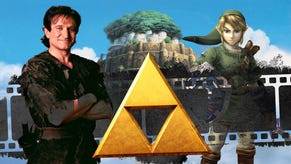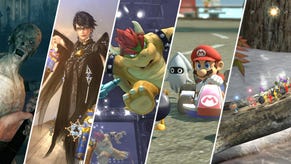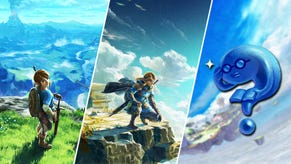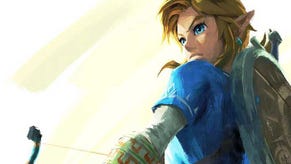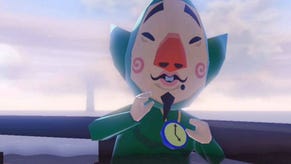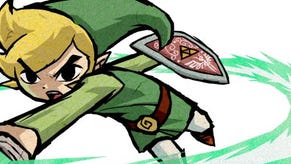Wind Waker HD: Remaking a Classic
We talk to Zelda boss Eiji Aonuma about revisiting a 10-year-old project and the unreliability of memory.
This article first appeared on USgamer, a partner publication of VG247. Some content, such as this article, has been migrated to VG247 for posterity after USgamer's closure - but it has not been edited or further vetted by the VG247 team.
With The Legend of Zelda: Wind Waker HD arriving soon, Nintendo gave us an opportunity to speak briefly with the man behind the scenes of the franchise for the past decade, Eiji Aonuma. Through a teleconference with Aonuma in what appeared to be Nintendo's Kyoto headquarters, we asked him a number of questions about the design and thinking behind this new version of the GameCube classic.
USGamer: Thank you very much for meeting with us. Have you been able to take any time off since Wind Waker HD's development closed?
Eiji Aonuma: No, we've had no sort of break. A Link Between Worlds is going into the final stages and we're working hard. Even when I get home, I'm getting home late. I want some vacation. I want some time off.
USG: How much longer do you have on A Link Between Worlds before you get that time off? Or do you even get time off after that?
EA: What we're looking at, really, is a sort of trend. I finish one project and the next one is just overlapping. My family is not happy.
USG: But they do like Zelda games, right?
EA: My son absolutely does like Zelda games, and my wife has started playing the Zelda games as well. So that's great. They understand that I'm making this games, but… They're my family, and the fact that we're not taking vacations together, not going anywhere, it's not making them happy. We're trying to find a balance. It's tough. It's a whole different set of problems.
USG: I assume working on Wind Waker HD has been a little bit different for you in that it's a remake. I know you remade Ocarina of Time a few years ago, but that was outsourced to Grezzo. How has that experience been for you?
EA: With Wind Waker, it's been 10, 11, 12 years now since we worked on that title. Of course, I was the director, but there's still stuff that I've forgotten. And to be honest, the remembrances I have that are actually incorrect. There are things I remember – "Okay, this was this certain way" – and when I go to work on that particular issue or that particular feature, the people I'm working with say, "No, no, no, it was never that way." "Yeah, it was! I remember! This is how it used to be!" "No…" And sometimes my misremembering is actually creating problems while we're doing the development.
So the human memory is an interesting thing. When it works well, it's great. But at times like this, when you're going back and trying to work out something and you remember it in a way that it actually wasn't, it can be problematic.
USG: Can you give me any examples of things you've misremembered? Does anything come to mind?
EA: Just like I said before, 12 years have passed. Over time, I've worked on various different titles, and I've had lots of different experiences. There are lots of things where you think, "Well, this was done in a certain way. It was really sharp and fast and crisp. It worked really well." And then you go back and look at the game and you realize, "Gosh, it really wasn't." My memory says it's this way, and it wasn't.
Among those things are the close-ups on different items, the demo scenes showing how different items work. When you're in the boat and pulling up a treasure, I didn't envision it being that long. This time around, I was like, "Wow, does it really take this long?" I was a little bit impatient about how long it took. We needed to take a look at things like that and figure out a way to make them a bit shorter, so we're tightening things up. So one example is pulling treasure up from the ocean.
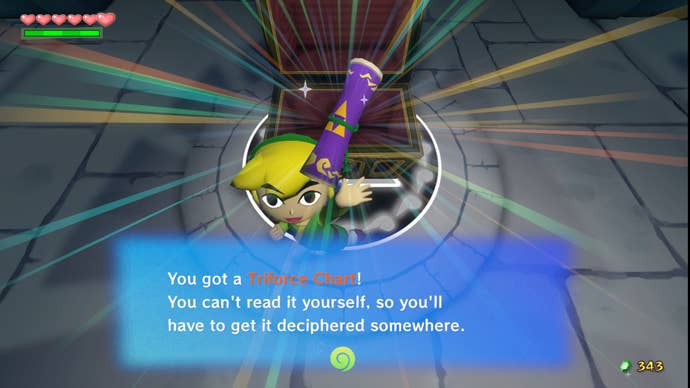
USG: How has that disconnect between memory and reality helped inspire you to make some of the changes in the game?
EA: Actually, the influence it's had on development and what it changed for us was that we planned for it. When we did Ocarina of Time, we saw some of the same sorts of things, and so I knew that the same phenomenon was going to occur when we got started on Wind Waker. We just said, "Okay, be on the lookout for things that don't match up to what we thought we had created. Let's make sure that we change them as we find them throughout the game." So it just became part of our overall development plan.
USG: So it hasn't just been your memories and your instincts that have helped shape the changes in the remake -- it's been the team's? How comprehensive would you say that the overhaul to the game has been?
EA: To answer your first question, yeah, it's absolutely the entire team. It's a very common topic of conversation for us to sit around and say, "Did we really do it that way? Is that how it used to be?"
As far as how comprehensive our remake of this game is, for myself, I played the entire game from beginning to end, and any time I found something that interrupted the flow of play, or if there was a stumbling point or anything like that, we made an effort to see what we could do to remove that obstacle or to smooth out that stumbling point. Again, we went from the beginning of the game all the way to the very end.
USG: That sort of smoothing-over is something that you see in a lot of games these days, and sometimes it takes the personality out of the game. What did you use as a guideline for what to remove and what to keep? Sometimes a little bit of resistance from a game is good. You have to make an effort, and that actually makes you like a game more. How do you keep from taking out that positive friction from the game's design?
EA: I think there really are a lot of different cases you have to look at. I don't think there's any set rule for how to determine what is something you want to improve or smooth over and what you want to leave as it is. I think the important thing for us as developers is to start at the beginning and play and really get into the flow of the game and put ourselves in the player's shoes. If you just focus on one thing here, one thing there, and you look at those objects individually, outside of the context of the whole game, and make changes to them, you're not doing a service to the player or to the game itself. You're taking them out of their context.
So again, it's really important to look at the overall player experience and look at the game through the player's eyes. That's very important, to look at it with fresh eyes and make sure you're feeling what the player feels. When you hit a point in the game that's too difficult or maybe too easy, you're seeing it in that overall context, and not just as an individual instance or individual experience. If something is too tough and gets the player in a mood like, "This is terrible, I can't do this," then of course that's something we want to look at. If it's so easy that we're just going to breeze through it and not remember having solved that puzzle or overcome that challenge, that's something we want to look at and possibly revise as well.
But again, the important thing is to look at the overall game flow and try to experience it from the player's viewpoint, so you're impacting the whole experience, and not just those single instances or single events.
"I played the entire game from beginning to end, and any time I found something that interrupted the flow of play, we made an effort to see what we could do to remove that obstacle or to smooth out that stumbling point."
USG: How much distance do you think you need from something that you worked on to be able to give it that fresh perspective? Like, if Mr. Iwata came to you next week and said, "All right, once you're done with A Link Between Worlds, it's time to remake Skyward Sword or Twilight Princess," are those too fresh in your memory? Or do you think you'd be able to be far enough removed from them to be able to give them the same treatment as Wind Waker HD?
EA: That's a tough question. Of course, if you've just finished a game and somebody says, "Hey, I want you to remake that game," it's too soon. All you're going to get is reactions like, "No, thank you, I'm done with that." So I think 10 years seems to be a pretty good distance, a pretty good amount of time. You can rationally, without getting too emotionally involved or emotionally upset… You can look at your memories of what you did versus the reality of what's actually there. You still have some fairly fresh memories, but they're not so recent that they impair your judgment.
That's something that producers have to do when they're working on a game regardless. They have to have that sort of mindset where they can view these things with an impartiality and make sure that they're not just following their own… They can view them impartially so they can create the best games they can.
I really wish there was a technology where we could go in and zap certain portions of our memory, just erase them. If we could do that without any risk, we could play the game, have fun with it, and then turn around and erase that piece of memory, and then go in and play the same game and experience it for the first time and have that feeling of excitement all over again. I really wish we could do that.
USG: That would also be great if you played a really bad game that you just wanted to forget about.
EA: Well, that's not what I'm talking about. [laughs]
USG: We've talked a lot about some of the internal design changes to Wind Waker and the way mechanics work within the game, but a big part of the change in Wind Waker HD is how the player interacts with the game. The original Wind Waker, of course, was designed for the GameCube controller, but Wind Waker HD is meant for the GamePad. I was wondering if you could talk about the approach you've taken with changing the player experience, the game interface itself, for this version, and some of the conclusions you've arrived at.
EA: One of the things that was key to starting this whole remake discussion and saying, "Yeah, this is a great idea" was just the assignments of the buttons themselves. When you look at the assignments on the control sticks and the A button and the X and Y buttons and all that, the GameCube and the Wii U versions are nearly identical. We thought, "Wow, we can just map this right over. This is going to be great. We can do this."
But also, we looked at the touch screen, and we decided… We didn't know whether to call it a big screen or a little screen. It's really up to you. But you have this screen right there in front of you, and we thought that we could really use this for realtime map location. This is great for an adventure like Wind Waker, because you have the map right in front of you, and as you're moving around you can keep track of where you're at and where you're going.
For example, when you're doing some of the surveying work in this game, in the GameCube version, you pull up the map and you find… "Okay, I have to go over to this place. I have to take a look at this." You put the map away and move around. Then you think, "Wait a minute…" and you pull the map back out. Then you put the map away and you move and then pull the map back out again. Put it away, pull it back out. It was troublesome for the player to have to do this process over and over again while they're moving around the world. But with Wii U, you can move around and have the map open the entire time. You'll be able to track your movement in real time on this screen that's right in front of you. That's something that, obviously, is a great improvement. It makes the game play that much better.
"Consumers don't like it when they're told, 'Hey, this is the only way you can do this one thing. This is how you're going to do it.'"
USG: Do you find the need to also account for off-screen play, for someone playing the game entirely on the GamePad… Do you find the need to allow for that was an impediment to designing some of the touch screen interface elements and the separate map system? Or is it pretty easy to make that compromise?
EA: For me, I think the best style for this remake is using both the TV and the GamePad together. I think that's the best way to play the game. But of course, playing on the GamePad itself has its own unique attractions as well. Obviously, you get to play it without having to worry about the television. Some of the map features I talked about, you're going to have to go back to the original style of playing – pull the map out, put it away – and for some people who don't mind that or like that, that's going to be a good experience for them. But what I think is unique is that you have the ability to let the user choose the experience they want to have. We also have Classic Controller support, so with all these different options, people are going to find the style that works the best for them.
As far as whether or not it was an impediment to our design, the answer is no. I think if we had decided, "This is the only style of play that we're going to support and everything has to fit into this box," then yes, it would have been. But we've decided that we want to support all these various gameplay styles and allow the users to pick one that works the best for them or that's most expedient to the situation they're in. And so we allow for all of that. It absolutely wasn't an impediment, because right from the beginning of the game, we decided to support these different play styles. There was never any, "Oh, gosh, that doesn't fit into what we're trying to do." There were no moments like that.
USG: That sort of freedom of choice and a lot of diverse play style options is something that I don't see a lot of in Nintendo games. Can you speak to that move toward more openness and more freedom for the player to pick and choose their approach to the game?
EA: I think that giving consumers a choice to do something that fits their own lifestyle… We're trying to correspond to lots of different people, and so the wider the choices we provide to them, the more needs we're able to meet. If you like it one way and she likes it another way and I like to play it a different way, the more of those we can meet, the happier the consumer's going to be. That's something that I think we've always been conscious of and tried to implement, as long as I can remember.
Consumers don't like it when they're told, "Hey, this is the only way you can do this one thing. This is how you're going to do it." As a consumer myself, I don't respond well to that sort of user interface. I think we do consciously think about that, and it's something that we're trying to always implement. It adds value to the product, to have that built in from the ground up.
USG: One thing I was surprised about when I played a demo of Wind Waker, further into the game, is that when you pull out the bow and arrow, you can actually play the game almost like a shooter – walking around in first-person mode and taking out enemies from a distance with the arrows. This is the first time I've ever played a core Zelda game where it had that different feel to it. It was really surprising.
EA: Personally, I really enjoy shooting the bow in that first-person perspective, being able to take aim at an enemy from a distance and really take my time and lock in and fire. It's an exciting thing. It's something that I enjoy as well. But that alone really doesn't make a Zelda game. That alone isn't a feature for us to focus on. Zelda's all about lots of different experiences for the player to take part in.
For example, one thing that's been… I don't want to say it's a difficulty, but something we've encountered is that it's not easy to go from swinging a sword in the third-person perspective, when you're doing swordplay, to switching to your bow and then jumping into a first-person perspective. All of a sudden you have something that's blocking your line of sight. There are other things that make that not an easy transition. But I think it's something that we're getting better at. We're able to do it more smoothly. That's something that I hope to be able to continue working with and making more enjoyable and easily accessible.
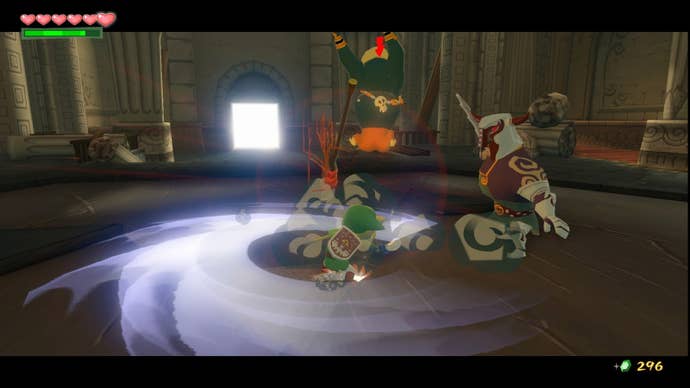
USG: In the original Wind Waker, I always shuddered a little bit when I had to go into first-person mode and fire an arrow, but this time around I thought it was really fun, because of that added freedom. It changed the game experience for me. I don't want to play the whole game in that mode, but it becomes a more valuable part of the arsenal as a result of this little design change.
EA: Yeah, I think that the gyro control has done so much for us. It's been a huge benefit for us as developers, the capability that the GamePad has. It gives you a more direct control feeling. It feels like you're doing it. It's easy to change directions. It's easy to look around. Again, the gyro sensor has done a lot for us as far as making that experience something that we can do better and more often.
USG: When I've told people about my experience with the first-person mode in the game, they've said, "Well, Mr. Aonuma has spoken about how he's been inspired by Skyrim." Was this one of those things you pulled away from playing games like Skyrim, and can we expect to see this kind of inspiration – maybe some of these elements – in future Zelda games?
EA: I just wanted to say, I've been a bit surprised by the focus on my comments about Skyrim. I started playing Skyrim because the name was so close to "Skyward Sword" and I wanted to see what that was about. [laughs] I didn't pick it up because it was popular or because it was getting good reviews or anything like that. I just wanted to take a look at it. "Oh, okay, this is what this game's about. There are some things in here that are sort of Zelda-esque and maybe some things that aren't."
But there was no inspiration taken from Skyrim. It didn't impact what I was thinking about for future Zelda titles. I'm always thinking about, "Okay, next time, what are we going to do with the next one?" As a producer, whenever I can find more time to play games, I'm taking that free time to go out and play other games just to play them and see what's out there.
As far as whether or not those are inspiring me or influencing my decisions, I guess it's probably the same way as when I talk to young developers or new people on our staff, or when I read interviews with other people saying, "Yeah, this game was influenced by my experience playing Zelda as a kid." Or, "Zelda really impacted my design decisions going forward." I think the problem with that is that everything you play influences what you're thinking, but I'm not looking at other games to try and find inspiration. If it happens, it's a natural process.

